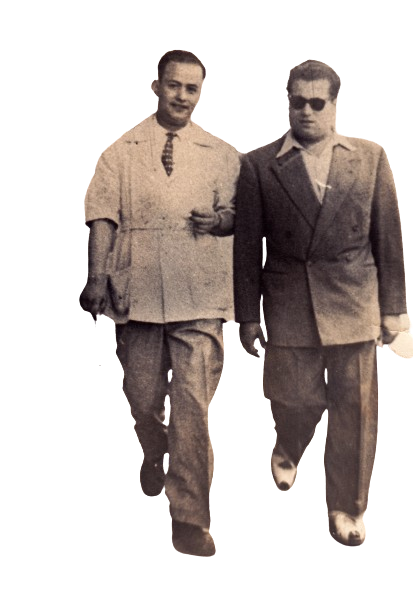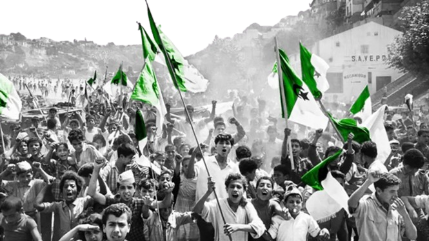The martyr lawyer Ali Boumendjel
المحامي والزعيم الوطني الجزائري علي بومنجل أحد الشخصيات البارزة التي أثرت في مسار ثورة التحرير الجزائرية.
اعترف الرئيس الفرنسي إيمانويل ماكرون يوم الثلاثاء 03 مارس 2021 بأن بومنجل تعرض للتعذيب والقتل على أيدي جيش دولته الاستدمارية الفرنسية، قبل 64 سنة، مما أكسب قضيته بعداً رمزياً خاصاً، و أبان على توازي إجرام فرنسا مع تظاهرها بصناعة و كفالة الحريات لعقود.

ولد علي بومنجل في 24 مايو 1919 في عائلة مثقفة، وتلقى تعليمه في كلية دوفرييه بمدينة البليدة، حيث تعرف على العديد من مناضلي حزب الشعب الذين أصبحوا فيما بعد رموزاً لثورة التحرير الجزائرية مثل عبان رمضان وبن يوسف بن خدة وسعد دحلب.

بدأ بومنجل حياته المهنية كصحفي في جريدة “المساواة” التي أشرف عليها أنصار المناضل فرحات عباس. لاحقًا، انتقل إلى مجال المحاماة، ورافق المحامي الفرنسي الشهير جاك فيرجيس في مسيرته المهنية، مما ساهم في تكوينه كأحد أبرز المحامين المدافعين عن مناضلي الثورة الجزائرية.

مع اندلاع الثورة الجزائرية في 1 نوفمبر 1954، انضم بومنجل إلى صفوف الثورة عام 1955، حيث أصبح من أهم المحامين اللامعين الذين دافعوا عن الثوار الجزائريين. وفي 9 فبراير 1957، ألقي القبض عليه من قبل جيش الاحتلال الفرنسي، وتعرض للتعذيب لمدة شهر كامل على يد الجنرال بول أوساريس وأعوانه.

في 23 مارس 1957، تم رمي بومنجل من الطابق السادس لإحدى البنايات في العاصمة الجزائرية، وأعلن الاحتلال وقتها رواية الانتحار. استمرت هذه الرواية الوهمية حتى كشف الجنرال أوساريس الحقيقة في مذكراته عام 2000، مما دفع الرئيس الفرنسي إيمانويل ماكرون في عام 2021 للاعتراف بتعذيب وقتل بومنجل على أيدي الجيش الفرنسي.
تحتفل الجزائر منذ عام 2004 بيوم 23 مارس كذكرى وطنية للمحامين، تكريمًا لروح الشهيد علي بومنجل وكافة المحامين الذين ضحوا بحياتهم من أجل حرية واستقلال الجزائر.
تعتبر قضية علي بومنجل رمزاً للقضايا الوطنية والإنسانية التي دافع عنها المحامون والمناضلون الجزائريون. إن الاعتراف بمآثره والتكريم السنوي عند ذكراه يعكس التقدير الكبير الذي يحظى به في تاريخ الجزائر، ويؤكد على أهمية دور المحامين في النضال من أجل العدالة والحرية


Algerian lawyer and nationalist leader Ali Boumendjel is one of the
prominent figures who influenced the course of the Algerian liberation revolution. French President Emmanuel Macron acknowledged on Tuesday, March 3, 2021, that Boumendjel was tortured and killed at the hands of the French colonial army, 64 years ago, which gave his case a special symbolic dimension. This revealed France’s hypocrisy despite its claims of manufacturing and safeguarding freedoms for decades.
Ali Boumendjel was born on May 24, 1919, into an educated family and received his education at Douaumont College in Blida, where he came to know many militants of the People’s Party who later became symbols of the Algerian liberation revolution, such as Abane Ramdane, Ben Youssef Ben Khedda, and Saad Dahlab.
Boumendjel started his professional life as a journalist at the newspaper ‘Al-Massawa’ under the supervision of the activist Ferhat Abbas. Later, he moved into the field of law, accompanying the famous French lawyer Jacques Vergès in his career, contributing to his development as one of the prominent lawyers defending the Algerian revolutionaries.
With the outbreak of the Algerian revolution on November 1, 1954, Boumendjel joined the ranks in 1955, becoming one of the prominent lawyers who defended the Algerian revolutionaries. On February 9, 1957, he was arrested by the French colonial army and subjected to torture for a full month by General Paul Aussaresses and his aides.
On March 23, 1957, Boumendjel was thrown from the sixth floor of a building in the Algerian capital, and the occupation forces claimed it was a suicide. This false narrative persisted until General Aussaresses revealed the truth in his memoirs in 2000, prompting French President Emmanuel Macron in 2021 to acknowledge the torture and killing of Boumendjel by the French army.
Since 2004, Algeria celebrates March 23 as a national day for lawyers in honor of the martyr Ali Boumendjel and all the lawyers who sacrificed their lives for the freedom and independence of Algeria.
The case of Ali Boumendjel symbolizes the national and humanitarian issues defended by Algerian lawyers and militants. Recognizing his crimes and the annual tribute to his memory reflects the great esteem he holds in Algerian history, emphasizing the importance of lawyers’ role in the struggle for justice and freedom

